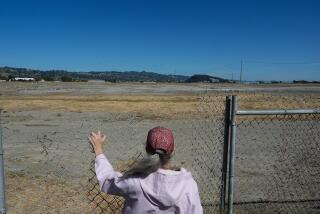Deal Should Lessen Risks for Hazardous Waste Firm
A few months ago, William Prachar, chief executive of American Ecology, was watching his company’s cash flow when it began to resemble a gas gauge about to strike empty. He had to do something in a hurry. “I didn’t want to not pay my bills,” Prachar said.
So he went loan shopping at banks, about 30 of them, and discovered that the old joke about bankers is true: They only lend you money when you don’t need it.
Prachar understands that his company is an unusual risk. American Ecology, based in Agoura Hills, operates two low-level radioactive waste dumps that bury contaminated surgical gloves, clothing, containers of radiopharmaceuticals from medical labs and nuclear power plants, for the 50 to 300 years needed before the radioactivity decays to harmless levels.
Potentially Hazardous
It is a dirty, potentially hazardous business, not only because of the possible community health problems if the dumps leak, but because if that happens the company’s finances get hazardous too.
For years American Ecology has been under a financial cloud because of unresolved lawsuits filed after radioactive materials from two former dump sites began leaking. How the dumps would be cleaned up and how much the company would have to pay was uncertain. There was always the possibility that the lawsuits could bankrupt the company.
But 2 weeks ago, Prachar reached an agreement in principle for Browning-Ferris Industries, a $2-billion-a-year waste conglomerate based in Houston, to invest $28.5 million in American Ecology by buying preferred stock, bonds and options. Prachar felt like he had hit a home run. “This is a very exciting deal for us,” he said.
Browning-Ferris immediately made a $5-million low-interest loan to American Ecology to help the cash flow. And if Browning-Ferris converts all its investments into stock over the next 3 years, it will own about 51% of American Ecology and provide Prachar with a corporate big brother to lean on.
Small Following
American Ecology’s stock has been on a roller coaster in recent years because of its legal problems. Few financial analysts follow the stock, much less recommend it, and on the day Prachar announced his deal with Browning-Ferris, Wall Street yawned. American Ecology’s stock didn’t budge. (On Monday the stock closed at $12.75.)
But then Prachar has been trying to avoid taking a hazardous spill since 1984, when Teledyne, the Los Angeles conglomerate, spun off American Ecology and put Prachar, a former Teledyne attorney, in charge.
The big worries were two dumps, one in Sheffield, Ill., about 2 hours outside of Chicago, the other in rural Maxey Flats, Ky. In Illinois the radioactive landfill started to leak into water on the sites with a variety of toxic wastes, from pesticides and lead to benzene and industrial solvents. Illinois filed two suits against American Ecology, one of them asked for $97 million in damages, while the Environmental Protection Agency’s Superfund program is trying to figure out how to clean up the mess in Kentucky. Estimates for the cost of the Kentucky dump cleanup range from $30 million to $200 million.
Statement Qualified
Because American Ecology is a small company--it earned a profit of $4.7 million on sales of $68 million last year--its accountants had no choice but to qualify its financial statement, the business equivalent of waving a red flag not to trust the figures because they could change dramatically for the worse.
Oddly, the company’s latest cash pinch came because American Ecology had settled one of its Illinois lawsuits. Last spring, the company agreed to spend about $7 million to clean up part of the Sheffield dump and maintain it for the next 10 years. The company set aside a $3.9-million reserve to cover some of the costs, which is why the company lost $2 million on sales of $15.6 million for the quarter that ended June 30.
The other, unresolved Illinois suit centers on the chemical portion of the Sheffield dump, although American Ecology got a bit of good news recently when an independent report filed with the EPA said the contaminated water did not pose a public health hazard because it had not leaked beyond the dump site. Prachar said he hoped to have that suit settled within 9 months at a cost “we can live with.”
American Ecology still has the Kentucky dump case to fret over, but its role in that cleanup is not likely to be so onerous because there are plenty of other defendants who figure to help pay for it.
So what does Browning-Ferris see in American Ecology?
For one thing, American Ecology is working on building a $30-million low-level radioactive waste dump in the Mojave Desert. Dump sites are much safer in dry areas, and even the Sierra Club environmental group had some good things to say about American Ecology’s site selection. The dump, scheduled to open in 1991, could be a big moneymaker. American Ecology averaged a profit margin of 11% in its hazardous waste business over the past 5 years. Prachar is also pushing ahead and plans to bid on another $50-million low-level radioactive dump site in Pennsylvania.
To help raise more cash, he has agreed to sell for $10 million National Ecology, its subsidiary that burns ordinary trash and turns it into electricity.
American Ecology still faces several ifs: If the remaining lawsuits are settled for a reasonable amount, if Browning-Ferris exercises its options and provides added financial muscle, if the new dumps American Ecology wants to build work as designed and do not leak, then Prachar’s company may finally have turned the corner. Those ifs, of course, will have to wait for another day.
In the meantime, Prachar savors the advice the many bankers gave him when he was desperate for a loan. “Gee, once you get the Sheffield lawsuit settled, come back and talk to us.”
More to Read
Inside the business of entertainment
The Wide Shot brings you news, analysis and insights on everything from streaming wars to production — and what it all means for the future.
You may occasionally receive promotional content from the Los Angeles Times.











